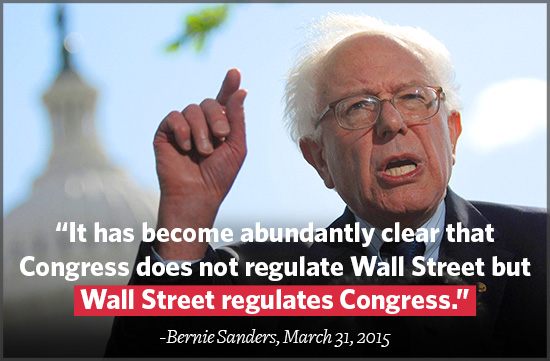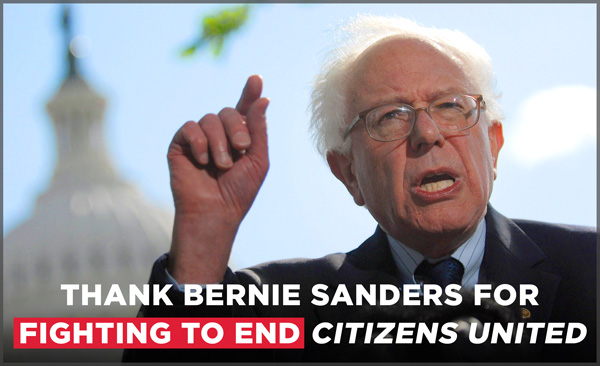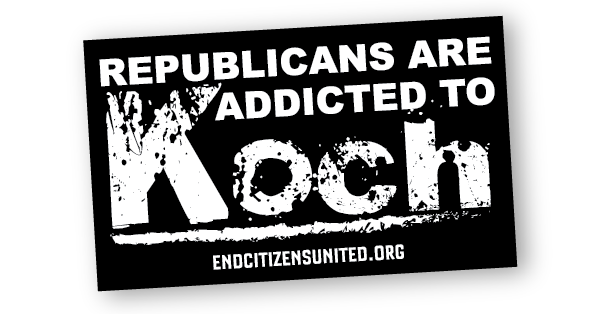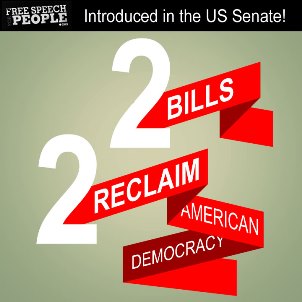Citizens United
[Citizens United] violates the essence of what made America a great country in its political system. Now it's just an oligarchy, with unlimited political bribery. Jimmy Carter, 39th President of the United States.
Trump-Musk feud shows what happens when unregulated money floods politics (6/8/2025)
Citizens United Explained
The 2010 Supreme Court decision further tilted political influence toward wealthy donors and corporations.
(1/29/2025)
End the “Citizens United” Ruling with a “Democracy for All Amendment” (3/1/2023)
"The US experiment in self-governing democracy died in 2010 with the most consequential Supreme Court ruling in US history: Citizen's United." Garikai Chengu

"A democracy cannot function effectively when its constituent members believe laws are being bought and sold." Justice Stevens
As long as Citizens United is good constitutional law, shareholder primacy will be bad for society. If we cannot keep corporations out of our democracy, then we must have more democracy in our corporations. Corporate law should be reformed to require attention to non-shareholder interests in the boardroom. It’s Law, But It Shouldn’t Be
The problem with Citizens United ... its inability to recognize a broader set of justifications for limiting the distorting effects of concentrated wealth. We the Corporations, How American Business Won Their Civil Rights: Adam Winkler
“Campaign finance is like the gateway issue to every other issue that you might care about whether it be education or tax reform or foreign policy.” Ann Ravel
"If you wonder why the United States is the only country in the industrialized world not to have a national health care program, if you're asking why we pay the highest price in the world for prescription drugs, or why we spend more money on the military than the rest of the world combined, you are talking about campaign finance. You are talking about the unbelievable power that big-money interests have over every legislative decision." Senator Bernie Sanders (Vt)
Links
Four
Years After Citizens United: Is Campaign Cash Buying Justice in State Courts? (1/22/2014)
Overturn Citizens United.
— Bernie Sanders (@SenSanders) November 12, 2024
Billionaires cannot continue to buy elections in this country. pic.twitter.com/tp0Lhd1VxV
Democracy in America means one person, one vote.
— Bernie Sanders (@BernieSanders) September 12, 2024
It does not mean billionaires buying elections.
I would hope that everyone in this country, regardless of their political persuasion, can agree that we must overturn Citizens United. pic.twitter.com/8n2C0wY9cb
Citizens United is among the worst decisions in history. It corrupts our system every day. https://t.co/nHOXClLP77
— Robert Reich (@RBReich) May 15, 2024
YOU MIGHT WANNA READ THIS 😆
— Eric Garland (@ericgarland) September 10, 2023
So billionaire Harlan Crow was bribing the Supreme Court when Citizens United went through - and The Federalist Society helped and they ALL tried to overthrow the government in 2021?
Oh. 😂 https://t.co/o1qafxKHT0
"Speech doesn't corrupt, money corrupts. And money isn't speech." Russ Feingold
The Supreme Court, by adopting an a historical and improperly narrow view of corruption, has shut down an exploration of the very real threat that unrestricted campaign spending actually posses to our democracy....corruption, broadly understood as placing private interests over the public good in public office, is at the root of what ails American democracy. (from David Cole's, New York Review of Books review of, Corruption in America: From Benjamin Franklin's Snuff Box to Citizens United: Zeyphyr Teachout.)
Today is the 10th anniversary of the atrocious Citizens United decision.
— Cenk Uygur (@cenkuygur) January 21, 2020
This opened the floodgates for corporate influence in our politics.
Case in point: @ChristyforCA25 pic.twitter.com/jkG4nikCRx
... both parties are willfully ignoring the greatest threat to our democratic process, further exacerbated by the 2010 U.S. Supreme Court decision in Citizens United v. FEC, a ruling that legitimizes the corporate takeover of American political campaigns. In private, our leaders know how corrupting big money is, but they refuse to reform our campaign finance laws for fear of losing influence and advantage. Patriot Acts, What Americans Must Do to Save the Republic: Catherine Crier
Justice Anthony Kennedy was resolute in his view that Citizens United wouldn’t create massive power & political speech advantages for corporations. He was wrong then, and he’s wrong now. https://t.co/QHIVwjVjW9
— Danielle McLaughlin (@MsDMcLaughlin) November 5, 2022
The Supreme Court in the Citizens United case, and its prequels and progeny, vested money with First Amendment rights. By this decision, the court gave the top 1 percent in income the power of dozens of votes for any single vote cast by the average American, and the top 0.1 percent the power of hundred of votes. It denied Congress the power to protect the inherent value of a citizen´s vote. Joseph A, Califano Jr. Our Damaged Democracy.
Democracy After Citizens United (10/2010)
Today seems like a good day to remind you that Citizens United is among the worst decisions in history. It must be reversed, or the Constitution must be amended to nullify it.
— Robert Reich (@RBReich) April 6, 2021
TV stations are hot commodities in the wake of the Supreme Court’s infamous Citizens United decision freeing up billions of Super PAC and dark money dollars that flow down by the billions to broadcast and cable operators each election cycle. So the bazaar never closes. TVNewsCheck.com recently reported that nearly 300 stations worth over $8 billion changed hands last year alone, up 367 percent in value from 2012. Just recently the FCC has approved major transactions involving Tribune, Sinclair, and Gannett. To make matters worse, companies have devised clever strategies to end-run the FCC’s ownership rules through arrangements that allow them to control stations they do not technically own. The [FCC] Commission needs to come down hard on these arrangements. Michael J. Copps 3/2014 CJR
My new one @Slate on the Decade of Citizens United: The fallout from Citizens United has been more devastating for American politics than many could’ve imagined. https://t.co/lOcXGrFrof via @slate
— Rick Hasen (@rickhasen) December 19, 2019
"With all due deference to separation of powers, last week the Supreme Court reversed a century of law that I believe will open the floodgates for special interests—including foreign corporations—to spend without limit in our elections. I don't think American elections should be bankrolled by America's most powerful interests, or worse, by foreign entities. They should be decided by the American people. And I'd urge Democrats and Republicans to pass a bill that helps to correct some of these problems." President Barack Obama expressed his concern over the Supreme Court's decision during his 2010 State of the Union Address,
Here's the state of American democracy. You get one vote for president. So does Sheldon Adelson. Except—being a multibillionaire—he gets to invest $176 million to elect candidates who represent the rich. We must overturn Citizens United and move to public funding of elections. https://t.co/yL0UNFY06r
— Bernie Sanders (@BernieSanders) October 16, 2020
Study: Most Americans want to kill ‘Citizens United’ with constitutional amendment (5/10/2018)
Peter Thiel’s midterm bet: the billionaire seeking to disrupt America’s democracy (10/15/2022)
The Disgust Election (10/26/2014)
Senate to Vote On Amendment to Overturn Citizens United (7/2/2014)
Bernie Sanders Vs Citizens United (4/11/2014)
Jimmy Carter is right.
— Public Citizen (@Public_Citizen) October 1, 2023
Until Citizens United is overturned, the corporate oligarchy will maintain the power to block policies favored by majority of Americans – like raising the minimum wage, reversing climate change & securing Medicare for All.https://t.co/XoNDUGqFCK
BREAKING: Harlan Crow and his family's average yearly political contributions went up 862% after Citizens United was decided in 2010.
— Americans For Tax Fairness (@4TaxFairness) May 1, 2023
Who provided a deciding vote for that case?
Justice Clarence Thomas, a "family friend" they showered with luxury travel and gifts for 20+ years. pic.twitter.com/GS2KCq6ktd
Reversing the Grievous Error of Citizen's United (2/4/2014)
Los Angeles joins more than 175 cities in national push for constitutional amendment (5/22/2013)
Connecticut Calls for Constitutional Amendment to Overturn Citizens United (9/12/2012)
In Citizens United v. FEC, the Supreme Court asserted that corporations are people. Worst decision ever!
— Tony 🌊 #Roevember 🇺🇸 (@TonyHussein4) November 4, 2022
SCOTUS removed reasonable campaign contribution limits, allowing a small group of wealthy donors and special interests to use dark money to influence and corrupt elections. pic.twitter.com/AHeLwfMsCF
Larry
Lessig's Open Letter to Americans against Citizen's United.
Citizen's United needs to be reversed because "Campaign finance law underlies all other substantive law." Sign this petition or that petition.
The Supreme Court’s ruling in Citizens
United handed control of our elections
and our government to giant corporations and the super-rich.
Over time it has brought back Fascism.
It will of course take some time to distill what occurred in the
2012 elections — and some things may well stay secret forever
— but we already know quite a bit.
Of course, anyone who watches TV or listens to commercial radio in
a battleground state knows from personal experience that things
have gone awry. But it’s not that easy to get a
bird’s-eye view of the overall electoral landscape.
Consider in combination these 10 observations on the
current electoral scene. It’s worse than you may realize. But
don’t be discouraged. Be motivated.
1. Record sums are being spent on the election.
Spending on federal elections will exceed $6 billion, far more than
any previous election, according to projections from the Center for
Responsive Politics.
2. A torrent of outside money is flowing into the election,
exceeding $1 billion.
Because of Citizens United, Super PACs and other outside
groups are spending spectacular sums. Karl Rove’s Crossroads
operations say they will spend $300 million. The Koch Brothers have
said they will raise and give $400 million. And the U.S. Chamber of
Commerce aims to spend $100 million.
3. A very small number of super-rich and corporate donors are
fueling the outside groups.
Led by casino magnate and billionaire-25-times-over Sheldon
Adelson, the top 100 individual contributors account for almost
three-quarters of all the money raised by Super PACs. There’s
every reason to think an even smaller group is powering the outside
groups that do not disclose their donors.
4. Dark money is casting a dark shadow over the
election.
Groups organized as social welfare organizations or trade
associations do not need to disclose the donors fueling their
campaign-related spending. Corporations in particular are
exploiting the opportunity for secrecy. The U.S. Chamber of
Commerce maintains a $200 million annual budget, and says it will
spend $100 million on the 2012 elections. But in 2011, corporations
that disclosed their contributions to the Chamber gave between $10
million and $12 million (some disclose ranges of donations only).
Of that total, only $3.5 million were non-tax-deductible
contributions that can be used for political spending — just
a tiny fraction of the
corporate money funneled through the Chamber for campaign spending.
5. Outside money is fueling nasty, negative attack ads on an
unprecedented scale.
Virtually all of the outside money is going to attack ads. More
than 90 percent of Rove’s Crossroads spending has been spent
against candidates; all of the money by the Obama-supporting
Priorities USA; more than 90 percent of the spending by the U.S.
Chamber of Commerce. Outside groups are spending money on attack
ads because they work. Candidates, however, are somewhat deterred
from running attack ads, because voters may hold them accountable
for the tone of their campaign. Outside groups aren’t
accountable to anyone (except their handful of funders) and
therefore aren’t deterred at all.
6. The post-Citizens United world is helping
consolidate
a financial oligarchy.
Of the roughly 50 individuals who have given $1 million or more to
Super PACs, about a third come from the financial world. Overall,
Wall Street and the financial sector are pouring far more money
into the 2012 elections than any other industry; the industry has
spent almost twice as much on the presidential race as any
other.
Wall Street’s money is heavily Republican this year, but Wall
Street is not inherently tied to the Republican Party. In 2008, the
financial sector leaned significantly Democratic, with about 54
percent of its political donations going to Dems.
As important as where their money is going is how much the
financial titans are spending. This reflects their shrill
opposition to the modest Dodd-Frank financial reform legislation,
yes; but perhaps an even more important reason that the Big Finance
guys are spending so much is that so much wealth is concentrated in
the financial sector. Big Finance has been unreasonably enriched by
the current system — at the very direct and visible expense
of the rest of us — and now they are spending a tiny portion
of their riches to lock in that system.
7. With all eyes on the presidential race, outside money is
having a bigger impact on congressional elections.

With his hundreds of millions, Karl Rove can afford to spend to
influence the presidential contest. But most of the outside groups
are focusing their spending on congressional elections. In the
contest for the Ohio Senate seat currently held by Sherrod Brown,
for example, outside groups have spent more than $32 million.
Outside groups have spent more than $10 million in a dozen senate
races. The U.S. Chamber of Commerce has
thrown at least $100,000 at 35 races.
8. Spending by outside groups is affecting state and local
elections, including judicial races, across the country.
More than three-quarters of states elect judges or vote to retain
them. More than a decade ago, the U.S. Chamber of Commerce saw an
opportunity to influence jurisprudence by spending big in state
judicial elections. Outside interest spending is now increasingly
common in state judicial elections. In North Carolina, R.J.
Reynolds and other corporate interests have poured $800,000 into a
state supreme court race.
Comparable sums are deluging other state and local races across the
country. Example: the oil giant Chevron has spent $1.2 million on a
local political committee to back three city council candidates in
Richmond, California, where the company operates a large oil
refinery plagued by safety violations.
9. Candidate-specific Super PACs are making a mockery of
individual campaign donation limits and the notion that outside
groups are independent of candidates.
An individual can donate a maximum of $5,000 to a candidate ($2,500
each for the primary and general election). Give to a
candidate-specific Super PAC, however, and the sky is the limit.
Sheldon and Miriam Adelson have donated $20 million to the
Romney-supporting Super PAC, Restore Our Future. And congressional
candidate-specific Super PACs are prevalent: A recent Public
Citizen
report found that nearly 60 percent of the Super PACs active in
the 2012 election are devoted to supporting or defeating a single
candidate, many funded (and/or managed) by friends and allies of
the candidate they support.
The Citizens United decision was explicitly premised on the
idea that outside election spending was independent of candidates
and therefore could not be corrupting — an implausible theory
that cannot be reconciled with the prevalence of candidate-specific
Super PACs with a limited pool of very high donors.
10. All this spending makes a huge difference.
It’s not the case that the candidate with the most money
wins, but the spending certainly affects election outcomes. In
2010, we
found that outside groups backed the winning candidate in
60 of the 75 congressional races in which power changed hands. But
the impact is even more profound than this kind of analysis
suggests. The outside groups define the tone of the campaigns,
often establish the terms of debate, and affect the entire national
race in ways not easily quantified (for example, by forcing
opponents to spend limited resources on races that otherwise would
be safe). The need for candidates to raise extraordinary sums
forces them to spend lots of time with the ultra-wealthy, and less
time with regular people; it also makes them more accountable to
donors and less to everyone else.
And, no matter who wins, the big money spenders obtain massively
enhanced power to set the national policy agenda — including
by taking popular measures off the table. As one House of
Representatives staffer asked during a congressional briefing on
the effects of the Citizens United decision, “How do I
say ‘no’ to a deep-pocketed corporate lobbyist who now
has all the resources necessary to defeat my boss in the next
election?”
Things can’t continue like this.
If we care about our country, we simply can’t let this go on.
We need to do some relatively small things — like force disclosure
of the Dark Money flowing into the elections. We
need to do some big things, too. We need
public financing of our public elections. And we need a constitutional
amendment to overturn Citizens United and
restore democracy to the people.
Over this past year, we’ve done important and remarkable work
together. Disclosure remedies are now within reach. And we’ve
made dramatic progress in the long effort to win a constitutional
amendment.
Whatever happens on Election Day, it’s time to move to the
next level. We’re going to expand and deepen the grassroots
movement to reclaim our democracy, and put an end to the dominance
of Big Money.
Bibliography
The Scheme, How the Right Wing Used Dark Money to Capture the Supreme Court by Senator Sheldon Whitehouse & Jennifer Mueller
NINE BLACK ROBES: Inside the Supreme Court’s Drive to the Right and Its Historic Consequences, by Joan Biskupic
Nine Black Robes: Inside the Supreme Court’s Drive to the Right and Its Historic Consequences by Joan Biskupic
LADY JUSTICE: Women, the Law, and the Battle to Save America, by Dahlia Lithwick
The Supreme Court’s Fifty-Year Battle for a More Unjust America By Adam Cohen
PRESUMED GUILTY,How the Supreme Court Empowered the Police and Subverted Civil Rights by Erwin Chemerinsky
Justice Deferred, Race and the Supreme Court By Orville Vernon Burton and Armand Derfner
Dissent: The Radicalization of the Republican Party and Its Capture of the Court by Jackie Calmes.
The Court and The Cross, the Religious Right's Crusade to Reshape the Supreme Court Frederick S. Lane. (2008)
Law and Legitimacy in the Supreme Court by Richard H. Fallon Jr
The Agenda: How a Republican Supreme Court is Reshaping America by Ian Millhiser
The People Who Own the Country Ought to Govern It: The Supreme Court, hegemony, and Its Consequences (1983)
SUPREME INEQUALITY: The Supreme Court’s Fifty-Year Battle for a More Unjust America, Adam Cohen
The Political Constitution: The Case Against Judicial Supremacy. Greg Weiner
The Most Dangerous Branch, Inside the Supreme Court's Assault on the Constitution: David A. Kaplan
The Case Against The Supreme Court: Erwin Chermerinsky
American Oligarchy, The permanent Political Class: Ron Formisano
The
Court and the World, American Law and the New Global Realities: Stephen Breyer
Nation on the Take, How Big Money Corrupts Our Democracy: Wendell Potter and Nick Penniman
2.5
Billion Dollars, One Suspicious Vehicle, and a Pimp — On the Trail of
the Ultra-Rich Hijacking American Politics: Kenneth P. Vogel
Dollarocracy, How the Money and Media Election Complex are Destroying America: John Nichols and Robert McChesney
Corporations
Are Not People: Jeffrey D. Clements
